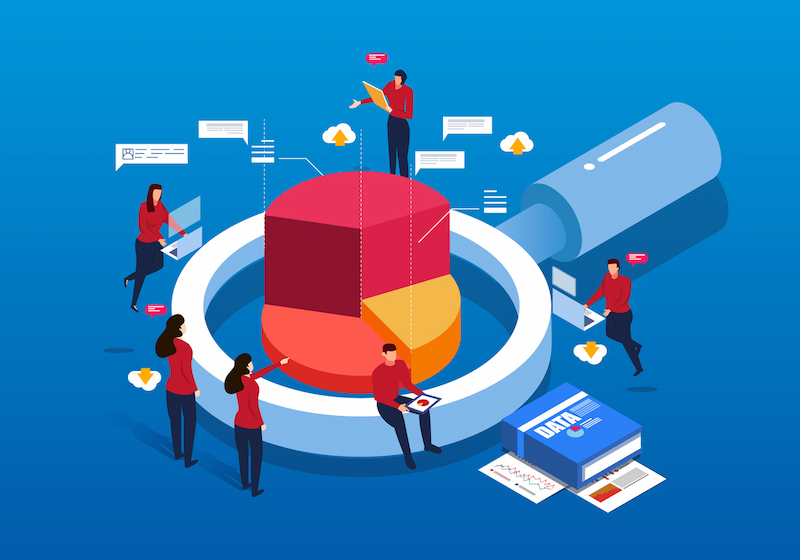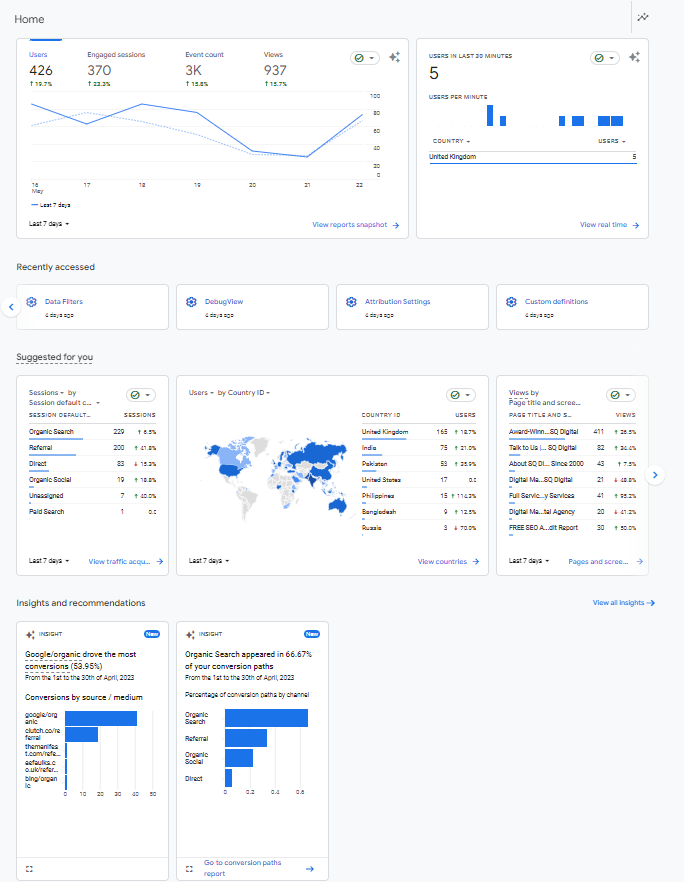In March of 2022, Google officially announced it would sunset Universal Analytics (UA) and move all users over to Google Analytics 4 (GA4) on July 1st 2023. If, like many marketers, you’ve grown comfortable measuring your website’s successes with UA, the idea of moving to a new system may be a daunting prospect.
At SQ Digital, we’ve been busy preparing for GA4 to ensure a seamless transition for our clients. However, if your business relies on the invaluable data offered by Google Analytics, it’s time to get familiar with the framework of GA4 and the changes you’ll need to make to prepare for the migration.

Google Analytics is an invaluable tool for any digital marketer. It allows us to track and monitor the performance of our website and different parts of our marketing campaign. It’s, therefore, no surprise that more than 65% of agencies use Google Analytics as their primary analytics tool. We now have a new Google Analytics update – so what do we know about this new version?
What Is GA4?
GA4 is Google’s new Analytics dashboard. It combines the insights and updates Google has been implementing and fine-tuning over the last few years in response to the changing digital landscape. The new features will allow you to oversee your customers better and leverage Google’s machine learning and insights to make more informed decisions about performance and the customer journey.
If you’ve been using UA for a long time, you may wonder why Google has decided to permanently migrate to this new system. Well, UA is now 18 years old, and over the years, regulations surrounding data privacy and data collection have changed significantly, impacting how user data can be collected and used. The move to GA4 offers enhanced privacy protection, better integration with other Google Products (e.g. Google Ads), and more granular data collection and usage control.
What’s New In GA4?
GA4 rolls a lot of new functionality and makes certain features previously available to some users standard across all GA4 properties. Here are some of the new aspects of GA4 that you can use to improve your data:
1. Data-Driven Attribution
We all know that last-click attribution models don’t accurately represent the complete picture of your digital marketing efforts. Instead, GA4 uses data-driven attribution to ensure the full impact of your digital marketing is considered when assigning attribution credit. You can also export this data to your Google Ads account to help with your optimisation.
2. Machine Learning
Machine learning has long been a crucial aspect of Google’s work towards the future of digital marketing, and now these advancements are integrated into GA4. This new functionality allows GA4 to generate predictive insights about user behaviour. Then, you can use those insights to create new audiences or audiences likely to interact positively with your conversion points.
3. Track Users More Accurately Across Touchpoints
GA4 allows you to collect user data as they move between platforms and sessions rather than presenting the more fragmented view of how people interact with your site currently available on UA3. This improved visibility allows you to trace the customer journey more accurately and make informed decisions to improve customer drop-off and conversion rates.
4. Expanded Integrations
By improving the connections across your Google platforms, you can use your GA4 insights more efficiently to inform your decisions across your digital marketing ecosystem.
5. Data Protection Compliance
As more and more country-level data protection laws come into effect, GA4 allows you to manage and minimise the user-level data you collect to ensure you remain compliant while not negatively impacting your key measurement functionality.
These new features allow you to access much more data and audience insights and provide you with the additional tools needed to use this data in your digital marketing strategy.
How Do I Set Up GA4?
If you’re already using Google Tag Manager to implement Analytics on your website, setting up GA4 is straightforward. There is already a default GA4 tag that you can add to your existing Tag Manager property to get yourself set up.
If you have added your Global Site Tag directly to your site or through another method, you can update your Tag with the GA4 code using the same format you have used historically.
However, if you’re unsure how to set up GA4, we recommend contacting SQ Digital. We are more than happy to help you out so you can begin benefitting from its great features.
What’s Changed Since the Initial Announcement?
Since the initial announcement, several updates have been made to GA4 to help improve user experience in line with feedback given to developers; let’s take a look.
- GA4 now offers the ability to modify and create events using regular expressions, with two new options available for event creation or modification in Google Analytics.
- Starting in April 2023, GA4 will automatically set up a basic GA4 property linked to a user’s Google Ads account if the Ads account still uses Universal Analytics conversions and/or audiences.
- Universal Analytics will be replaced by GA4, and standard Universal Analytics properties will stop processing data starting on July 1st
- Universal Analytics will be available, with editor access only, to view past data for one year before the platform will be sunset permanently.
- GA4 now focuses on events instead of page views, and every action a user takes will now be classified as an “event”.
Make The Switch To GA4 Today
There’s a lot to unpack with GA4, but the main takeaway is that it will continue to help you track and analyse the data across your websites and other platforms. It will also provide you with a more streamlined set of tools to use your data in more informed ways.
If you don’t have a current GA4 property and would rather leave it up to the experts so you can focus on running your business, contact us today for set-up.
As a digital marketing agency, we use Google Analytics daily to help guide our marketing campaigns and have over 20 years of experience helping SMEs succeed online.


